

Competition vs. Cooperation. Market Lovers Commit The Fallacy of Composition. The pop logic of free markets is fatally flawed.
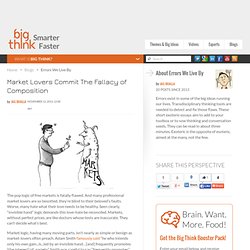
And many professional market lovers are so besotted, they’re blind to their beloved’s faults. Worse, many hate what their love needs to be healthy. Seen clearly, “invisible hand” logic demands this love-hate be reconciled. Markets, without perfect prices, are like doctors whose tests are inaccurate. They can’t decide what’s best. Market logic, having many moving parts, isn’t nearly as simple or benign as market-lovers often preach. As Gavin Kennedy notes the “invisible hand” was a popular literary metaphor in Smith’s day (Augustine and Shakespeare used it.) Evolutionary Economics and Darwin’s Wedge.
Economics is in our nature.
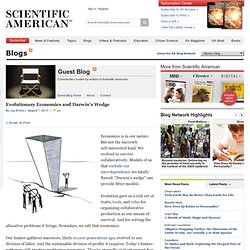
But not the narrowly self-interested kind. We evolved to survive collaboratively. Models of us that exclude our interdependence are fatally flawed. “Darwin’s wedge” can provide fitter models. Evolution gave us a rich set of traits, tools, and rules for organizing collaborative production as our means of survival. Our hunter-gatherer ancestors, likely 10,000 generations ago, evolved to use division of labor. Evolutionary economist Ulrich Witt notes that we face the same basic issue of coordination in today’s economies.
Frank coined the term “Darwin’s wedge” to describe how individual and collective incentives can diverge, driving added costs in competing for rank. Competitive overheads could be minimized by coordinating for mutual benefit. Market Lovers Commit The Fallacy of Composition. Darwin's Wedge & Dumb Competition. “Competition creates efficiency,” is preached as if it were a law of nature.
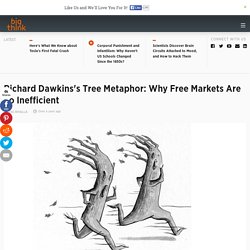
But nature itself teaches a different lesson. Biological competition can create foolish costs, and collective doom. News feed from Ethical Consumer - The Co-operative Movement and Open Source. Feb 11 Written by: 11/02/2013 15:47 Latest prize-winning essay online Last September as part of the Co-ops United conference held in Manchester we awarded our 'Co-operative Alternatives to Capitalism' essay prize.

We hoped the prize would encourage co-operators around the world to write, think and share ideas around the co-operative movement and the current economic crisis. We've been updating our website with the winning entries. The co-operative movement and the open source movement both create complex, world-class organisations motivated by social rather than financial goals. Behavioral Telescope Shows How Cooperation Works. Nature’s games aren’t all “red in tooth and claw” competitions.
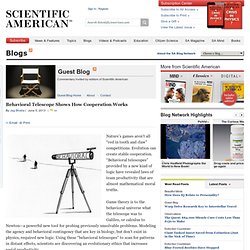
Evolution can create stable cooperation. “Behavioral telescopes” provided by a new kind of logic have revealed laws of team productivity that are almost mathematical moral truths. Game theory is to the behavioral universe what the telescope was to Galileo, or calculus to Newton—a powerful new tool for probing previously unsolvable problems. Modeling the agency and behavioral contingency that are key in biology, but don’t exist in physics, required new logic.
Using these “behavioral telescopes” to scan for patterns in distant effects, scientists are discovering an evolutionary ethics that increases social productivity. Game theory’s most studied scenario is the Prisoners Dilemma, which due to its origin in Cold War nuclear strategy, assumes everyone is untrustworthy. DEEP PRAGMATISM. An anthropological introduction to the emergence of the peer to peer relational dynamic. Republished lecture from a conference I participated in, in Milan on October 22 -23, 2010, i.e.
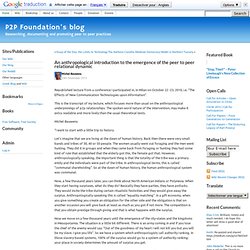
“The Effects of New Communication Technologies upon Information”. This is the transcript of my lecture, which focuses more than usual on the anthropological underpinnings of p2p relationships. The spoken word nature of the intervention, may make it extra readable and more lively than the usual theoretical texts. Michel Bauwens: “I want to start with a little trip to history. Let’s imagine that we are living at the dawn of human history. Now, a few thousand years later, you can think about North American Indians or Polynesia. Now we move on a few thousand years until the emergence of the city-states and the kingdoms in Mesopotamia. Now we move to the 16th century where we find a new invention: market pricing and the exchange of commodities. Let’s consider the logic of working for Wikipedia, Linux or Wikihow, in other words: shared knowledge shared code or shared design. What is the problem? Social scientists build case for 'survival of the kindest'
Researchers at the University of California, Berkeley, are challenging long-held beliefs that human beings are wired to be selfish.
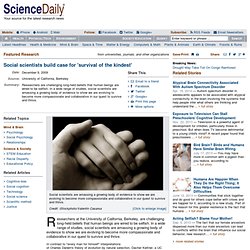
In a wide range of studies, social scientists are amassing a growing body of evidence to show we are evolving to become more compassionate and collaborative in our quest to survive and thrive. In contrast to "every man for himself" interpretations of Charles Darwin's theory of evolution by natural selection, Dacher Keltner, a UC Berkeley psychologist and author of "Born to be Good: The Science of a Meaningful Life," and his fellow social scientists are building the case that humans are successful as a species precisely because of our nurturing, altruistic and compassionate traits. They call it "survival of the kindest. " "Because of our very vulnerable offspring, the fundamental task for human survival and gene replication is to take care of others," said Keltner, co-director of UC Berkeley's Greater Good Science Center.
The Zeitgeist Movement Vancouver.